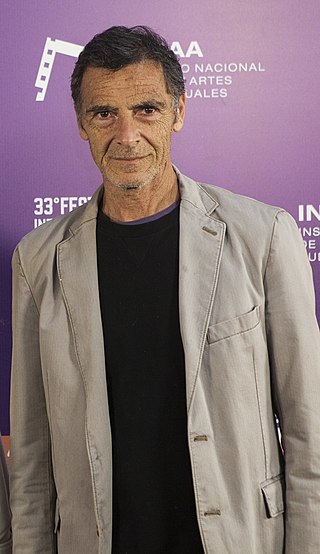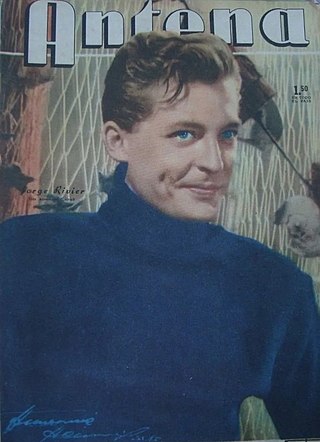| Novio, marido y amante | |
|---|---|
| Directed by | Mario C. Lugones |
| Written by | Based upon the novel Mademoiselle Ma Mere by Louis Verneuil |
| Starring | Enrique Serrano Tilda Thamar Tito Gómez Miguel Gómez Bao |
| Music by | George Andreani |
Production company | |
Release date |
|
Running time | 79 minutes |
| Country | Argentina |
| Language | Spanish |
Novio, marido y amante (transl.Boyfriend, husband and lover) is a 1948 Argentine comedy film of the classical era of Argentine cinema, directed by Mario C. Lugones and based upon Louis Verneuil's novel Mademoiselle Ma Mere. It premiered on January 22, 1948.
The film centers on a young beautiful woman that was forced to marry with an elderly man, but now it falls in love with his son.

Blanca de Castejón was a Puerto Rican actress who worked in the Golden Age of Argentine cinema in the 1930s and especially the Golden Age of Mexican cinema since the 1940s, where she achieved the greatest success and recognition. She was born in Comerío, Puerto Rico, and died in Mexico City.

María del Socorro Tellado López, known as Corín Tellado, was a prolific Spanish writer of romantic novels and photonovels that were best-sellers in several Spanish-language countries. She published more than 4,000 titles and sold more than 400 million books which have been translated into several languages. She was listed in the 1994 Guinness World Records as having sold the most books written in Spanish, and earlier in 1962 UNESCO declared her the most read Spanish writer after Miguel de Cervantes.
Argentina Sono Film S.A.C.I. is an entertainment company based in Buenos Aires that was one of the most important studios during the Golden Age of Argentina cinema of the 1930s–1950s. In its current format, it serves as a production and distribution company.

Mario C. Lugones was an Argentine film director of the classical era of Argentine cinema. He directed films such as the 1950 film Abuso de confianza.

Carlos Schlieper was an Argentine film director and screenwriter notable for his work during the classical era of Argentine cinema.
Louis Jacques Marie Collin du Bocage, better known by the pen name Louis Verneuil, was a French playwright, screenwriter, and actor.

Gustavo Garzón is an Argentine film and television actor.
Mi marido y mi novio is a 1955 Argentine film directed by Carlos Schlieper, starring Delia Garcés and Georges Rivière.

Enrique Serrano (1891–1965) was an Argentine actor and comedian notable for his work during the Golden Age of Argentine cinema.

Elva "Chunchuna" Villafañe is an Argentine model, actress and architect, born in Buenos Aires, Argentina.

Mademoiselle ma mère is a 1937 French comedy film directed by Henri Decoin, and starring Danielle Darrieux, Pierre Brasseur and Pierre Larquey. The screenplay was written by Jean Boyer, based on a play by Louis Verneuil. The music score is by Georges Van Parys.

Georges Aristide Claude Félix Rivière is a French retired actor who worked in Argentine cinema in the 1950s. He appeared in nearly 50 films between 1948 and 1970.
Alberto Terrones was an Argentine film and theater actor, with an extensive filmography.

Miguel Gómez Bao was a Spanish-born Argentine actor, notable for his work during the Golden Age of Argentine cinema. He was born in Malaga, Spain. He appeared in films, such as Amalia, (1936), Safo, historia de una pasión (1943) and La pequeña señora de Pérez (1944). He also did much work for radio and appeared on Radio El Mundo in the late 1930s.He was an actor and writer, known for Cuatro corazones (1939), Calles de Buenos Aires (1934) and Tararira (1936). He died in 1961 in Argentina.

George Andreani, pseudonym Josef Dvořáček (born as Josef Kumok; 28 February 1901 in Warsaw, Poland – 2 April 1979 in Buenos Aires, Argentina) was a Polish composer, film score composer, pianist, conductor, and actor. He was noted for his scores of some 75 Argentine films during the Golden Age of Argentine cinema from 1937 to 1959. Aside from his prolific work as a score composer, he was also conductor of the Orquesta Sinfónica Schenley in the 1940s.
Osvaldo Cattone was an Argentine actor who lived for over three decades in Peru and was considered one of the pioneer theater directors and actors of Peru.

Irma Roy was an Argentine actress and politician who served in the Chamber of Deputies from 1995 to 2005. Her daughters, Carolina Papaleo and Lydia Valeiento also became actresses. She was married to the actor Eduardo Cuitiño.
María Esther Corán was an Argentine actress. She starred in films such Fúlmine (1949), El nieto de Congreve (1949), La melodía perdida (1952), Marta Ferrari (1956) and El ayudante (1971). One of her best known roles was in the 1961 TV series Viendo a Biondi, co-starring Pepe Biondi. In 1997, she was honored with the Día del Actor award for her 50-year career.

Françoise Christophe (1923–2012) was a French film and television actress.
Daniel Guerrero was an Argentine actor, radio announcer and show host. He was best known as a telenovela actor who worked in many Latin American countries.